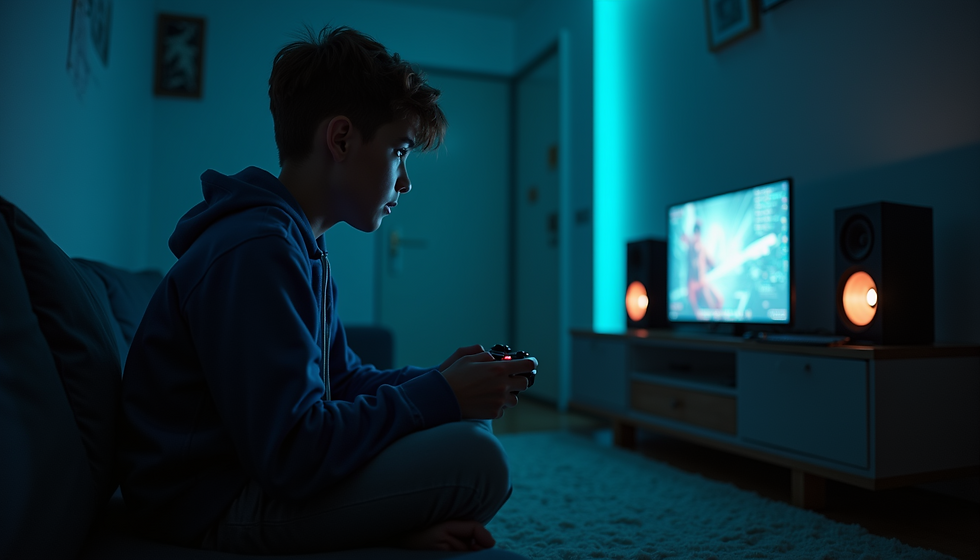The Long-Term Impact of Pornography Addiction on Teens Key Insights for Concerned Parents
- Matt Bulkley

- Nov 6, 2025
- 3 min read
Pornography addiction among teens is a growing concern that many parents face but often find difficult to address. The effects of this addiction go far beyond the immediate moment, influencing various parts of a young person's life as they grow into adulthood. Understanding these long-term impacts can help parents support their teens more effectively and encourage healthier habits early on.

How Pornography Addiction Affects Relationships
Research shows that heavy pornography use over several years can harm relationships. A 2016 study published in Psychology of Addictive Behaviors found that adults who used pornography heavily for four years reported lower satisfaction in their relationships. Emotional intimacy often suffers because pornography can create unrealistic expectations about sex and connection. This may lead teens to struggle with trust and reduce the effort they put into real-life relationships.
For parents, this means watching for signs that a teen’s social life or romantic relationships are affected. Teens might withdraw from friends or family or express frustration with partners. Encouraging open conversations about healthy relationships and emotional connection can help counteract these effects.
The Link Between Pornography Addiction and Mental Health
A 2019 study in the Journal of Sexual Research tracked adults over three years and found a clear connection between compulsive pornography use and increased anxiety and depression. Teens caught in this cycle often feel guilt and isolation, which worsen their emotional struggles.
Parents should be aware that mental health issues linked to pornography addiction are not just about the addiction itself but also about the feelings it creates. Support from family, counseling, and professional help can make a significant difference in breaking this cycle.
Impact on Self-Control and Productivity
Frequent pornography use can affect a teen’s ability to control impulses in other areas of life. A 2018 study in Neuroscience & Biobehavioral Reviews observed that over two years, heavy users showed weaker self-control related to work, school, or health goals. This happens because the brain’s reward system becomes overactive, making it harder to resist urges in general.
This means teens might struggle with procrastination, focus, or sticking to routines. Parents can help by setting clear expectations, encouraging time management skills, and promoting activities that build self-discipline.
Effects on Sexual Health
Long-term heavy pornography use can also affect sexual health. A 2020 study in the Archives of Sexual Behavior linked this addiction to problems like erectile dysfunction and lower satisfaction with real-life sexual experiences. The brain becomes conditioned to artificial stimuli, which can make normal intimacy less fulfilling.
While this may seem like a distant concern for teens, it is important for parents to understand these risks. Early education about healthy sexuality and open communication can help teens develop realistic expectations and avoid these issues.
Influence on Professional Performance
Pornography addiction can even impact a teen’s future career. A 2022 study found that compulsive users reported higher workplace stress and reduced focus over 18 months. The mental energy spent on the addiction detracts from achieving career goals and maintaining professional performance.
For teens, this means the habit can interfere with schoolwork, extracurricular activities, and later job responsibilities. Parents can support by encouraging goal-setting and helping teens find balance in their daily lives.
Taking Action Early Makes a Difference
The research clearly shows that pornography addiction affects many parts of life, from relationships to mental health and productivity. But there is hope. Studies indicate that reducing or stopping pornography use can lead to noticeable improvements in focus, emotional well-being, and relationships within just a few months.
Parents play a crucial role in recognizing the signs early and offering support. This might include:
Having honest, non-judgmental conversations about pornography and its effects
Encouraging healthy hobbies and social activities
Seeking professional counseling.
Providing resources for education about sexuality and mental health
Helping teens build strong, realistic connections and self-control now can protect their future well-being and happiness.
For additional resources on helping your teen overcome pornography addiction, check out the Recovery Toolbox for Teens.










Comments